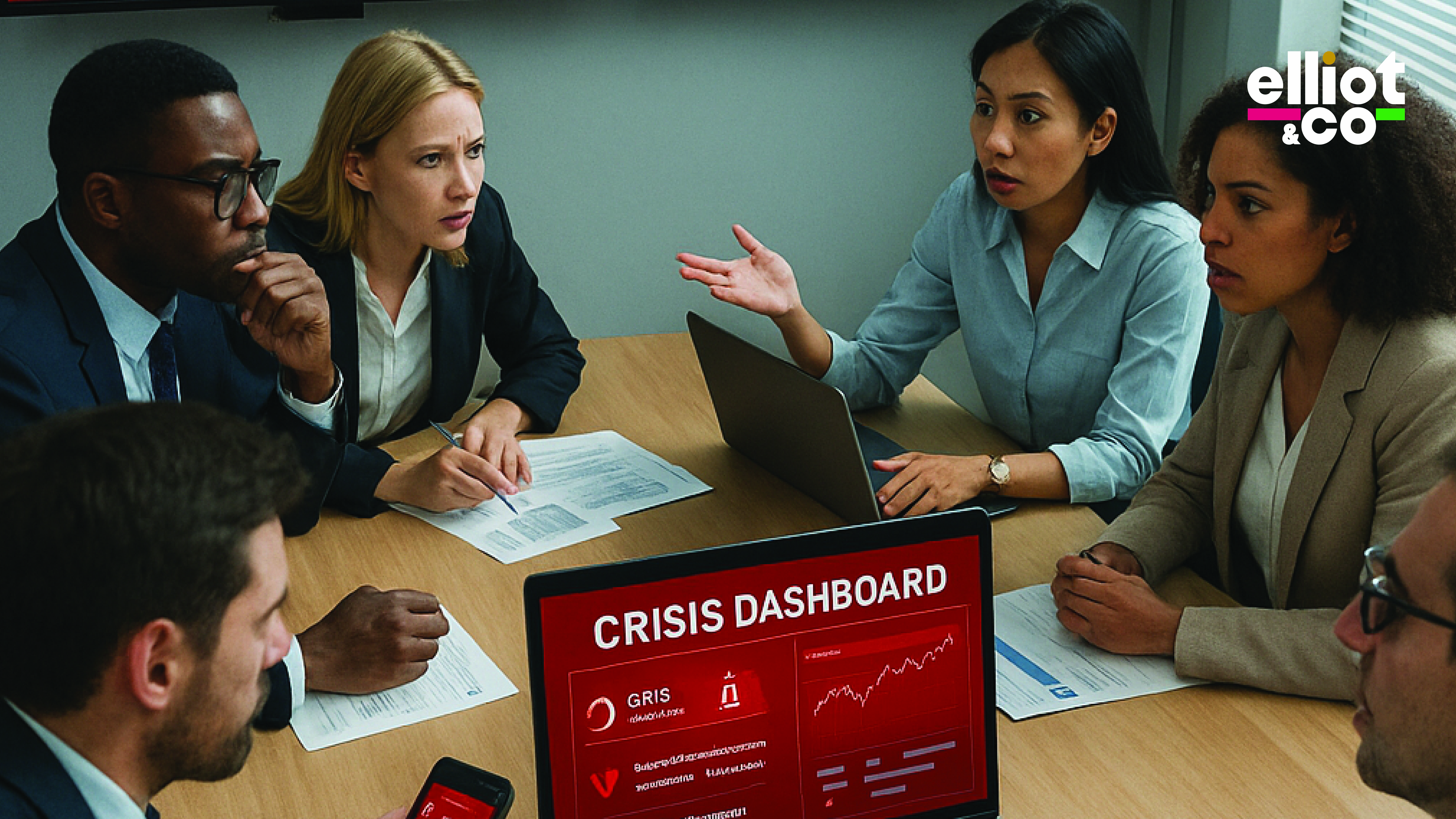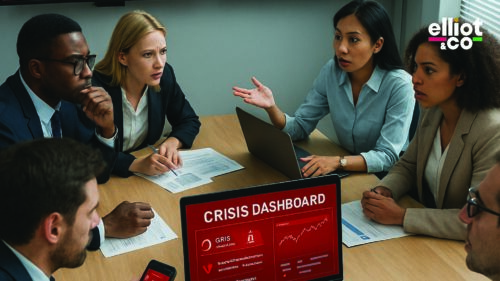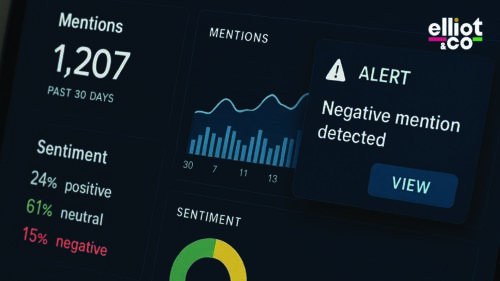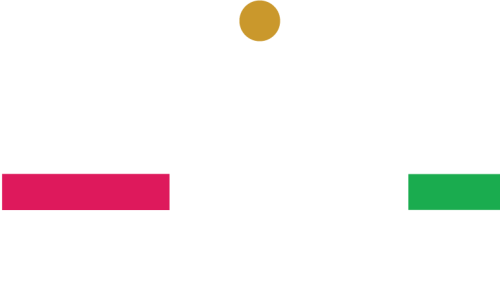
In public relations (PR), one of the most crucial responsibilities is managing crisis communication. This is because this field of communication revolves around shaping and protecting a company’s reputation in the eyes of the public. When a crisis strikes, that reputation can be at risk within seconds.
But what exactly defines a crisis? According to crisis communication expert Timothy Coombs, it is:
“The perception of an unpredictable event that threatens important expectancies of stakeholders and can seriously impact an organisation’s performance and generate negative outcomes.”
Put simply, a crisis is any unexpected event that could damage your brand’s public image, disrupt operations or reduce stakeholder trust. Crisis communication is how your brand responds and how it protects its credibility and relationships in the process.

Why Crisis Communication Matters More Than Ever
Today, we live in a hyperdigitised world where news, opinions and misinformation can go viral within seconds. A single tweet, TikTok video or even an anonymous post on Reddit can lead to widespread outrage or scrutiny. For brands, this means that any misstep or unresolved issue can quickly turn into a reputational crisis. underscoring the importance of building brand trust and long-term credibility.
The speed and reach of digital media make it essential for businesses to be prepared, proactive and strategic in their approach to crisis communication. A delayed or poorly managed response could result in long-term damage to brand equity, customer trust and, in the long term, even bottom-line results.
So, how can companies prepare themselves to face such challenges effectively? Here are three essential strategies for strong crisis communication.
- Mitigate Crises Through Online Reputation Management (ORM)
Most modern crises begin and evolve online. This is why businesses must actively manage their digital presence through a clear Online Reputation Management (ORM) strategy. A strong ORM approach not only helps mitigate risks but also plays a key role in increasing brand awareness and building relationships with stakeholders before a crisis strikes.
What ORM Involves:
- Monitoring mentions of your brand across digital channels, including media outlets, digital news websites, review platforms, blogs, forums and social media.
- Addressing negative comments, misinformation or customer complaints in a timely and respectful manner.
- Promoting positive content such as customer success stories, CSR efforts, expert commentary and awards to ensure a healthy balance in your brand’s search engine results.
The brand Honey, a well-known online coupon extension, once came under public scrutiny over alleged data privacy concerns. Unfortunately, the company did not respond quickly enough, and the backlash dominated search results and media coverage for weeks. With a strong ORM strategy in place, Honey could have responded earlier by pushing out transparent messaging and publishing credible content to help balance public perception.
Having ORM is like having a digital insurance plan; it does not prevent all crises, but it gives brands the tools to limit damage and regain control of the narrative.
- Prepare a Fast, Pre-Planned Crisis Response System
When a crisis emerges, time is of the essence. Waiting too long to respond can lead to speculation, customer frustration and a loss of credibility. Engaging a PR agency early on can ensure that messaging is clear and strategic, whether it’s managing media inquiries or writing press releases that reflect accountability, professionalism and trustworthiness. A fast and well-organised response plan helps a brand maintain control of the narrative and protect its reputation.
What Your Plan Should Include:
- Pre-approved holding statements that can be customised based on the nature of the crisis. These should be cleared in advance by legal, HR and communications teams.
- A designated crisis response team comprising senior leadership, legal advisors, PR consultants and social media managers.
- A clear communication structure that outlines how and where official updates will be shared, including press releases, social media platforms, company websites or media briefings.
In May 2024, Singapore Airlines responded swiftly and professionally after a tragic incident involving severe turbulence on one of its flights. Within hours, the airline issued an official statement, provided timely updates to the media, and offered support to affected passengers and families. Their compassionate and transparent approach helped preserve trust in the brand even during a highly sensitive moment.
Being prepared ensures your brand speaks with one voice and avoids panic or confusion when it matters most.

- Use Social Listening Tools to Detect and Defuse Issues Early
Effective crisis communication starts before the public even knows an issue exists — and this is where social listening tools come into play. Platforms like Isentia, Meltwater and Brandwatch allow businesses to track conversations across digital channels in real time.
What These Tools Help With:
- Detecting spikes in mentions, negative sentiment or misinformation that could signal a brewing issue.
- Identifying which channels or influencers are fuelling the conversation.
- Responding quickly with accurate information, clarifications or empathy before the situation escalates.
During the early stages of the COVID-19 pandemic, e-commerce platforms like Lazada and Grab used social listening to monitor public concerns about delivery safety, product availability and pricing. They were able to adjust messaging quickly, provide customer assurances, and roll out clear policies based on real-time feedback. As a result, they maintained user trust and avoided major PR missteps.
Social listening is not just a tool for detecting problems. It also helps brands understand audience sentiment, track the impact of their messaging and continuously adapt during a crisis.
Crisis Communication Is Not a Solo Effort
Managing crises is a high-pressure situation that requires collaboration, coordination and calm thinking. For brands with small in-house teams or limited PR experience, navigating these challenges alone can feel overwhelming, which is why many businesses choose to work with communication partners who specialise in managing sensitive situations.
At Elliot & Co, we support clients across Southeast Asia with proactive crisis planning, real-time response and long-term reputation building. Our goal is to help brands protect what matters most: their credibility and public trust, while maintaining a positive image that resonates with their loyal and potential customers.
Crises are not always avoidable, but how a brand responds can determine how it is remembered. Businesses that plan ahead, monitor online sentiment and act quickly stand a much better chance of surviving and even emerging stronger from a crisis.
Effective crisis communication is not about spinning the truth. It is about being prepared, honest, empathetic and strategic.
Need support with your crisis strategy?
Speak to our PR professionals at Elliot & Co to explore how we can help you prepare, protect and elevate your brand’s reputation in a crisis.

